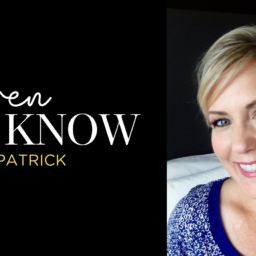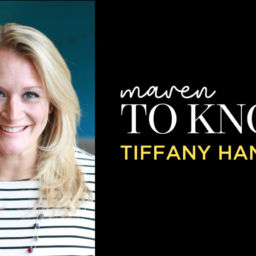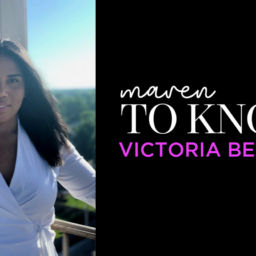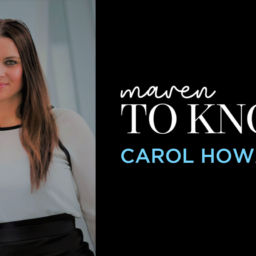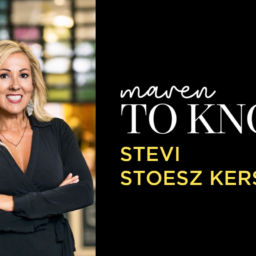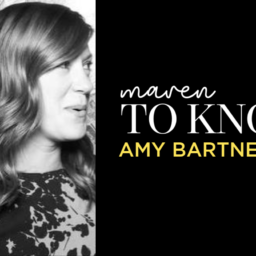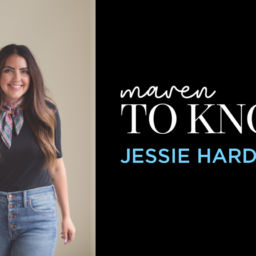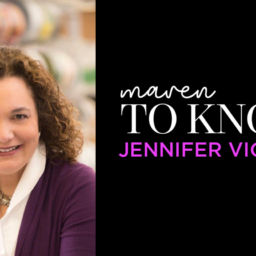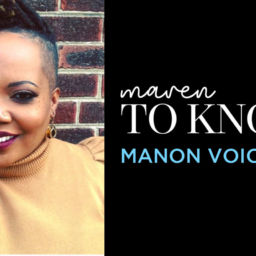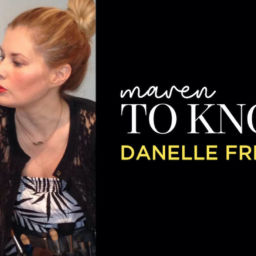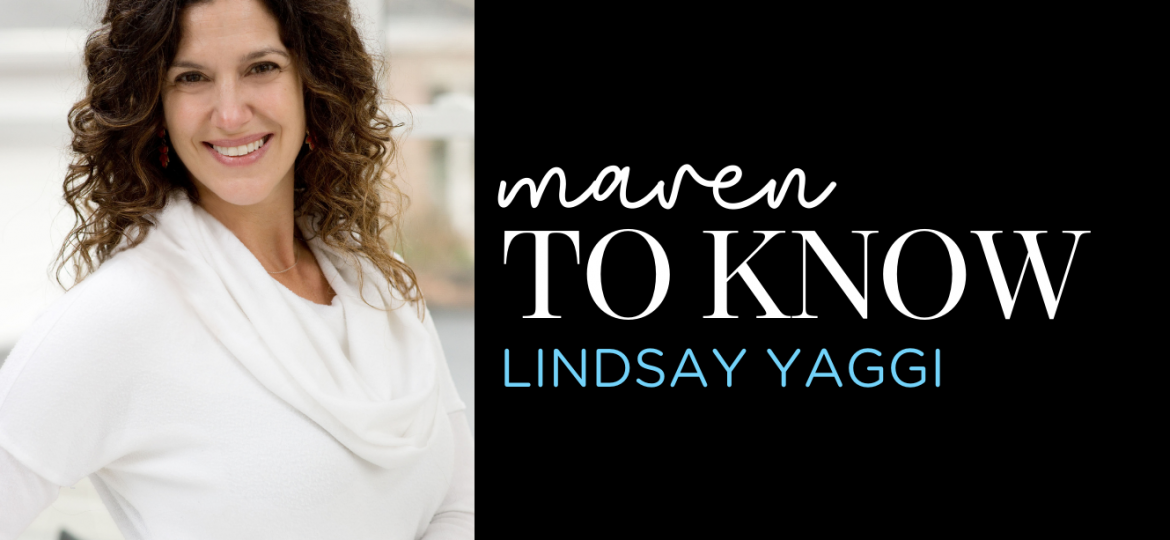
Maven to Know: Lindsay Yaggi, CEO, Figure of Speech
With over 17 years of speech language pathology experience, Lindsay Yaggi is a communication expert. This Indianapolis mom of three started her own private practice, Figure of Speech, in May 2018. But even before that, Lindsay worked as an Indiana First Steps early intervention speech therapist for more than 10 years.
Her career has been centered on helping children learn to communicate while remaining comfortable and she often incorporates methods of play into therapy, even remarking that her clients are like family.
As for 2021, Yaggi is hoping to choose happiness and understanding, no matter the circumstance—an admirable goal for any Maven.
How does figure of speech differ from other private speech therapy practices?
My practice is patient-centered, and I personally work with and give my energy and attention to every one of my clients. My clients and those who care for them are like family to me, and I am truly invested in their wellbeing and meeting their needs. I communicate with parents and caregivers frequently and keep everyone updated and working as a team.
A more unique aspect of my private practice is that I come to you versus you coming to me. I am able to conduct therapy sessions at a client’s home, daycare, many private schools, or a place in the community that is comfortable for the client like a library or park. Providing therapy in a client’s natural environment has many benefits. For example, I am able to center therapy around their everyday occurrences instead of in a contrived setting. In addition, since the pandemic, I built my practice to see clients both in person and virtually. Other practices may not be able to provide both those options, so it gives families a choice and allows them to decide based on their comfort level what they want to do during this unusual time.
What philosophies or strategies are at the core of your business?
My philosophy is to meet each client where they are and build from their strengths. I want my clients to be successful in their world, whatever it is they do on a day-to-day basis. It is important for me to get to know each client—their likes, their dislikes, who they spend time with, their current mode of communication (e.g., gestures, sign language, words, sentences, communication device), and what is going well versus what they want to improve. I then collaborate with my clients and/or their families to make short and long-term goals that truly support their needs. Speech therapy is not a cookie-cutter business. Each client is unique and I do my best to find out what is most important to them and proceed with therapy while keeping their long-term outcome always in mind. I want my clients to be their best possible selves when communicating and interacting with others and I believe getting to know their whole story (not just their speech story) is extremely important to consider.
I’ve read that some of your classes are based in play. What can you tell me about the benefits of playing in speech or language classes?
Since I was an early intervention speech therapist with Indiana First Steps working with 0 to 3-year-olds for over 10 years, I had to master the art of playing! Children learn as they play. Their brains are making new connections during these experiences and I really took that to heart when developing my practice. Learning new skills at an early age is crucial to a person’s overall development, but the beauty of it is that kids might be completely unaware that there is intervention taking place. They just think we are playing and having fun, so that’s a big bonus!
I have found that theme-based play works well with kids. When I use games, toys, books, puzzles, songs, etc around a theme like “on the farm” or “in the jungle”, it encourages kids to focus on specific vocabulary and concepts while repeating sounds and words over the duration of the session or class. Repetition is key to speech and language therapy because it allows a skill to be practiced and rehearsed over time, and gradually that skill will become easier.
What was it like to start your own business?
It was exciting because I knew I was ready to reinvent myself. I wanted to stay in the same field and continue as a speech therapist, but I wanted to have more opportunities for growth, creativity, and networking in the community.
Starting my own business also allowed me to have flexibility in my schedule so I could create more balance between work and home. Being a mother of three children spanning from high school to preschool, I needed to form my practice into what worked for me. I will say, starting out took some time and lots of research. I spoke to many other professionals, getting their advice and thoughts on ways I could develop my practice. I took baby steps figuring out what I wanted it to look like and set achievable short-term and long-term goals.
I have learned a lot through trial and error and when something doesn’t work the way I anticipate, I have to be willing to try a new direction. Watching my practice grow, shift, and go through changes definitely keeps me flexible, which is helpful in life as we know it right now.
What are the pros and cons of being your own boss?
The biggest perk is tapping into my creative side and knowing there are no limits as to what I can do. For example, my practice not only consists of providing one-on-one therapy but I have been able to expand my business by creating group classes for one to five-year-olds in the community. These classes are not therapy sessions, they are play-based classes for the child — and oftentimes their caregiver(s) — with the purpose of educating and teaching skills that will develop the child’s speech, language, and social communication. I have contracted with different businesses in the city, such as The Urban Chalkboard, to teach classes in their facility and have also offered my classes as an after school program in early education centers/preschools. It has been extremely liberating to be my own boss and explore different avenues in addition to traditional therapy.
This is not so much a con, but an adjustment I had to tackle. In addition to being a speech therapist, I became a businesswoman. I have new responsibilities such as marketing/advertising, scheduling, keeping my credentials/continuing education up to date, managing my expenses/finances, and being the sole decision-maker. I don’t have an employer helping me or managing those things anymore. Honestly, it was a much easier transition than I thought and I am happy to be the chief executive officer now!
I do miss the camaraderie of co-workers and being able to bounce ideas off of my colleagues in the workplace. I have worked with so many amazing individuals who have helped shape me into the therapist I am today. I feel fortunate to still be able to reach out and connect with my prior coworker friends at any point, but not interacting with them daily is missed.
What brings you the most joy in your field?
I can easily say witnessing the progress of my clients brings me the most joy. To be present when a child says his or her first word or when a client meets a goal or milestone after they have been working on it in therapy is truly incredible. I have teared up alongside parents when these things happen. We celebrate big and small accomplishments in my field, but whichever happens, it always feels so rewarding to help individuals gain skills and develop the confidence that they need to communicate with others.
What is your advice to young women interested in the speech language pathology field?
Speech language pathology is a dynamic field with many different options. I would advise looking into as many settings as possible and trying to shadow and speak to several speech pathologists to get a better idea about what areas interest you.
Explore work settings like early intervention programs, school systems, private practices, in- and out- patient hospitals, rehabilitation centers, skilled nursing facilities, home health agencies, and corporate businesses. Get an idea of what type of clientele you would want to serve (pediatrics, school-aged children, teenagers, adults, aging population) and what areas of speech pathology interest you.
The diversity of speech pathology allows you to specialize in a particular area or you can split your time and work in multiple areas of interest. It would also be helpful to start looking into universities that have undergraduate and master degree programs such as Indiana University, Purdue University, Butler, Ball State, and Indiana State University and see what their programs entail.
What is the best advice (career-focused or not!) that you’ve ever received?
My dear friend Jenni Kleinman Berebitsky passed away in August 2019 after living with ALS for 10 years. She was given a diagnosis to live only 18-24 months, but because of her attitude, her ability to control what she was able to control, and her desire to find inner strength with a disease that ultimately took away every amount of physical strength she had, she beat the odds and lived a meaningful, successful, fulfilling life until the day she died. Jenni will forever be my hero and my inspiration. Her advice will always be something I hold close to my heart.
Jenni’s wish is for her legacy to be a reminder to others “to live full out and embrace the moments of their lives honestly and with purpose.”
What goals or aspirations do you have for 2021?
In a world where technology can consume us, I aspire to make conscious decisions to unplug more often when I am not working. My goal is to be more present and increase the amount of time I spend doing yoga and mindful meditation. I also aspire to choose happiness and understanding as a response each day no matter the circumstance, situation, or condition. In turn, I believe this will ultimately help my business by giving me a clear mind, a fresh and open outlook, and more energy to put towards my career. If happiness and good intentions are the crux of my business plan and my life, I know the journey will be worthwhile and meaningful.
If you’d like to get in touch with Lindsay Yaggi about her services, email figureofspeech@yahoo.com.
Meghan Stratton is Indy Maven’s Communication Coordinator.
Want to be featured as a Maven to Know? Sign up for our Membership Program—we’d love to have you! See all the Maven to Know features we’ve shared so far.










